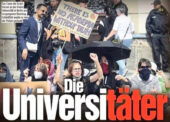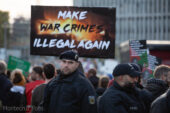After 14 years, the Council wants to recruit a new Counter-Terrorism Coordinator. Her remit will be expanded to include hybrid threats and cybersecurity. The Commission is also creating such a post.
The member states united in the European Council want to fill the position of the Counter-Terrorism Coordinator (CTC). The Council Secretariat has sent out an internal call for applications, the deadline is 15 June. The appointment will be made by the EU High Representative for the Common Foreign and Security Policy after consensus in the Council. The post is limited to five years, but a single reappointment is possible.
The creation of a CTC was decided by the then EU member states after the terrorist attacks of 11 March 2004 in Madrid as part of a declaration on the fight against terrorism. It is at the highest political level of the European Union. The post was first held by the Dutchman Gijs de Vries, and in 2007 the Belgian Gilles de Kerchove was appointed.
High ranking post
According to the German Federal Ministry of the Interior, de Kerchove has an office and a staff of five national “experts” seconded from the member states, one of these posts is currently vacant. In addition, the Council Secretariat funds five staff members for general office organisation.
Part of the CTC’s tasks is to publish regular political recommendations on “priority areas for action” and proposals for measures to the Council. He is monitoring their subsequent implementation.
As a political official, the CTC cannot issue orders. Its weight lies more in the work it does behind the scenes, relying on reports from national intelligence services. These are collected and analysed in the EU Information and Situation Centre (EU INTCEN).
Coordination with secret services
The European Union has no mandate to coordinate secret services. De facto, however, this is done by the current CTC This includes coordination with the Counter Terrorism Group (CTG), which brings together the domestic secret services of the member states. The informal group works ever more closely with the EU police agency Europol.
De Kerchove also networks with secret services from third countries, for example when it comes to the improved police and legal utilisation of “evidence from theatres of war” with the FBI or possible measures against end-to-end encryption in the context of 5G.
The Council has now placed the post of CTC directly under the Council President Charles Michel, according to the new tender, and has drastically expanded the mandate. It is looking for a high-level security coordinator on the topics of counter-terrorism, so-called hybrid threats and cyber security. This corresponds with the expansion of the INTCEN, which is also responsible for the aforementioned areas after a change last year.
Unclear remit at the Commission
The CTC’s profile wants a close coordination with the EU Commission. This will soon be facilitated, because the Directorate-General for Migration and Home Affairs there also wants to set up such a post. That was announced by the Commissioner for Home Affairs, Ylva Johansson, in December as part of the new “EU Agenda for Counter-Terrorism”.
What exactly the task of this “Counter-Terrorism Coordinator” should be remains vague. The Commission paper states that he or she will coordinate “the various EU policies” in this field and their financing. Like its counterpart in the Council, the coordinator is to cooperate with the other counter-terrorism bodies of the Council and the EU agencies.
Image: The acting CTC has been in office for 14 years, which is too long for the Council in the future. – All rights reserved International Institute for Counter-Terrorism (Screenshot YouTube)





Leave a Reply